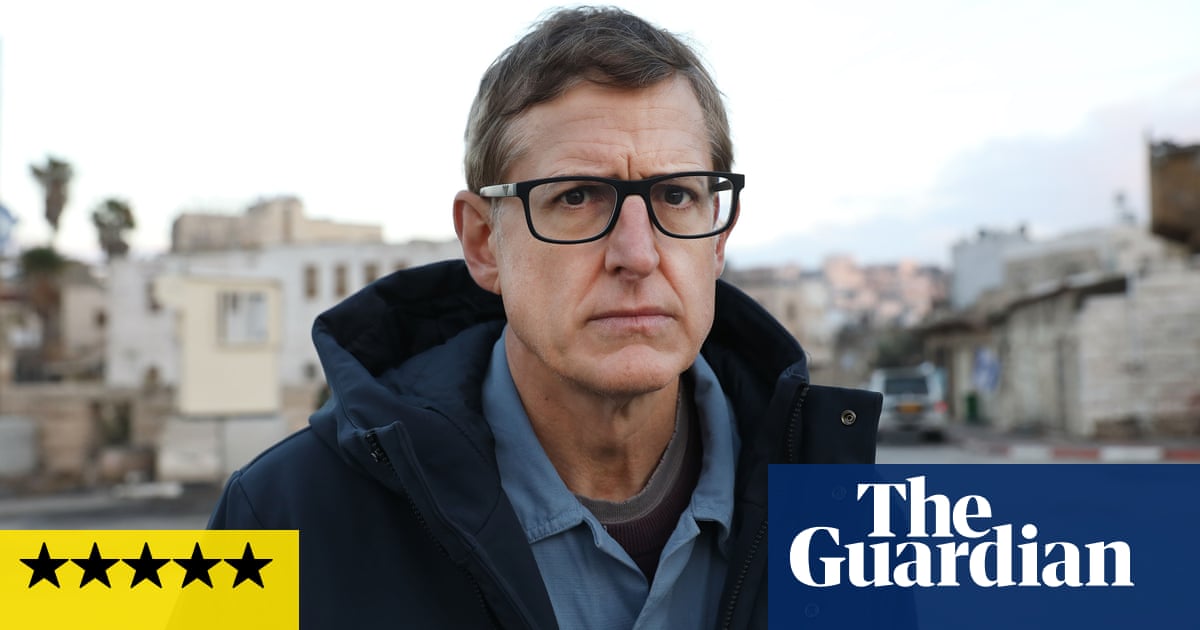If you’ve even casually been tracking Louis Theroux’s career, you will have detected a noticeable deceleration of late. For a while, after he shed the culty sheen of his Weird Weekends persona, Theroux emerged as a sober, probing documentarian who made films about drug addiction, sexual assault and postpartum depression. These films were, without exception, vital.
Then lockdown happened, and the wheels fell off. After going viral for a self-consciously ironic rap he did 20 years earlier, Theroux settled into the low-stakes quicksand of a generic celebrity interview podcast. You were left with the feeling of an extraordinary talent being wasted.
The Settlers lays all those worries to rest in an instant. By travelling to Israeli settlements in theWest Bank, Theroux is revisiting the subject matter of a documentary he made in 2011. That film, The Ultra Zionists, concerned a clutch of Jewish people who – propelled by religious nationalism – were infringing on international law by building their homes in Palestinian territory. But, 14 years on, he has returned to find that the settlements have accelerated. The settler ideology has found itself gaining political traction. What was fringe has now become mainstream.
As such, The Settlers requires Theroux to alter his approach. Ever since Weird Weekends, his stock in trade has been the faux-naïf, lulling his subjects into a false sense of security with his bumbling charm. With everyone from Jimmy Savile to the members of the Westboro Baptist Church, he was able to lay traps they simply didn’t see coming.
But the situation in the West Bank is so dire that the kid gloves have to come off. This is partly because he and his crew repeatedly find themselves subject to many of the confrontations and intimidations that blight the lives of Palestinians on a daily basis. During a visit to a Palestinian home, settlers drive up and point guns with laser sights through the windows at him. More than once, he has to politely ask people to lower their guns while talking to him. In one especially tense encounter, he has to bark “Don’t touch me” at a pair of balaclava-wearing Israeli soldiers.
In the early years, Theroux would gently attempt to convince his subjects that their worldview might not be the only one around. In the later, more serious films, he would leave long silences on which the viewer could project scorn on his behalf, saving his true feelings for the voiceover afterwards. In truth, there is some of this in The Settlers. When he meets Ari Abramowitz, a Texas settler in the West Bank who refuses to even use the word “Palestinian”, he holds his tongue. When he meets a rabbi who calls Palestinians “savages” and “camel riders”, he manages to do the same.
Then comes Daniella Weiss. A key member of the Israeli settler movement for 50 years, Weiss is Theroux’s prime target. She is able to hide her extreme views behind a friendly smile, no matter how aggressively he plays cat and mouse with her. But, at the end of the episode, they both get to each other like never before. Theroux corners Weiss and presses her on settler violence against Palestinians. She says none exists. He says he has witnessed it, notably in a video of a Palestinian being shot. She claims the Israeli shooter was acting in retaliation, then physically shoves Theroux in the hope that he’ll push her back. Instead, he does something he’s never done before. He calls her a sociopath.
I’ve been watching Theroux’s films for more than three decades, since his days on Michael Moore’s TV Nation, and watching him be this forthright feels like a true watershed moment in his career. This level of stridently editorialising just hasn’t been in his toolbox until now. Whether it works or not is debatable – by the end of the encounter Weiss has recovered herself enough to taunt “I wish you’d pushed me back” at him – but this new version of Louis Theroux feels like a deliberate adaptation to the ages. It suits him.
As with everything, you wish certain aspects of the situation could be explored more. Most notably, the peripheral glimpses of Israeli activists who protest against the settlements probably need more airtime, if only to demonstrate that this is a problem of individuals rather than an entire nation. But that’s by the by. It looks very much like we’ve got Louis Theroux back, and not a moment too soon.
The Settlers aired on BBC Two and is on iPlayer now
